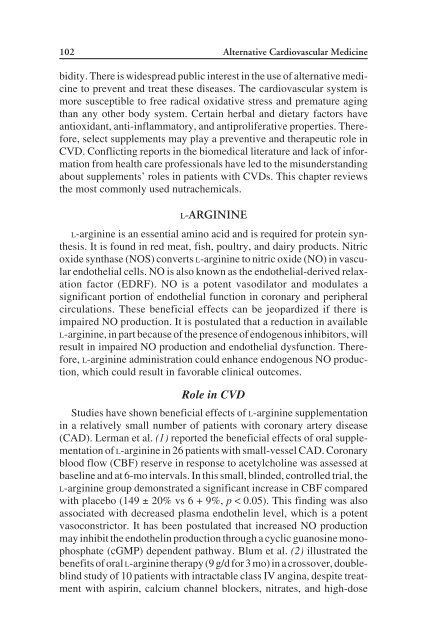Complementary Alternative Cardiovascular Medicine
Complementary Alternative Cardiovascular Medicine
Complementary Alternative Cardiovascular Medicine
You also want an ePaper? Increase the reach of your titles
YUMPU automatically turns print PDFs into web optimized ePapers that Google loves.
102 <strong>Alternative</strong> <strong>Cardiovascular</strong> <strong>Medicine</strong><br />
bidity. There is widespread public interest in the use of alternative medicine<br />
to prevent and treat these diseases. The cardiovascular system is<br />
more susceptible to free radical oxidative stress and premature aging<br />
than any other body system. Certain herbal and dietary factors have<br />
antioxidant, anti-inflammatory, and antiproliferative properties. Therefore,<br />
select supplements may play a preventive and therapeutic role in<br />
CVD. Conflicting reports in the biomedical literature and lack of information<br />
from health care professionals have led to the misunderstanding<br />
about supplements’ roles in patients with CVDs. This chapter reviews<br />
the most commonly used nutrachemicals.<br />
L-ARGININE<br />
L-arginine is an essential amino acid and is required for protein synthesis.<br />
It is found in red meat, fish, poultry, and dairy products. Nitric<br />
oxide synthase (NOS) converts L-arginine to nitric oxide (NO) in vascular<br />
endothelial cells. NO is also known as the endothelial-derived relaxation<br />
factor (EDRF). NO is a potent vasodilator and modulates a<br />
significant portion of endothelial function in coronary and peripheral<br />
circulations. These beneficial effects can be jeopardized if there is<br />
impaired NO production. It is postulated that a reduction in available<br />
L-arginine, in part because of the presence of endogenous inhibitors, will<br />
result in impaired NO production and endothelial dysfunction. Therefore,<br />
L-arginine administration could enhance endogenous NO production,<br />
which could result in favorable clinical outcomes.<br />
Role in CVD<br />
Studies have shown beneficial effects of L-arginine supplementation<br />
in a relatively small number of patients with coronary artery disease<br />
(CAD). Lerman et al. (1) reported the beneficial effects of oral supplementation<br />
of L-arginine in 26 patients with small-vessel CAD. Coronary<br />
blood flow (CBF) reserve in response to acetylcholine was assessed at<br />
baseline and at 6-mo intervals. In this small, blinded, controlled trial, the<br />
L-arginine group demonstrated a significant increase in CBF compared<br />
with placebo (149 ± 20% vs 6 + 9%, p < 0.05). This finding was also<br />
associated with decreased plasma endothelin level, which is a potent<br />
vasoconstrictor. It has been postulated that increased NO production<br />
may inhibit the endothelin production through a cyclic guanosine monophosphate<br />
(cGMP) dependent pathway. Blum et al. (2) illustrated the<br />
benefits of oral L-arginine therapy (9 g/d for 3 mo) in a crossover, doubleblind<br />
study of 10 patients with intractable class IV angina, despite treatment<br />
with aspirin, calcium channel blockers, nitrates, and high-dose


